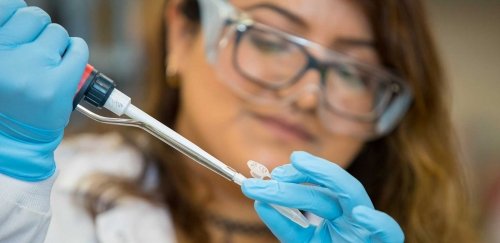Graduate Schools
- Rhode Island College
- Boston University
- Lesley University
- Providence College
- Tufts University
- University of California, Riverside
- University of Connecticut
- University of Massachusetts Dartmouth

Prepare yourself for the STEM careers of the future by studying math, science and technology at Rhode Island College. Our programs in mathematics, physical and applied sciences, computer information systems and data science combine a rigorous academic foundation with ample experiential learning opportunities, enabling students to apply what they've learned across classrooms, laboratories and field placements. Small class sizes ensure that students build meaningful relationships with faculty and participate in cutting edge research projects. The high-skill workforce of tomorrow is being educated today at Rhode Island College.
Are you curious about the life around you? A B.S. degree in biology will give you a basic understanding of the study of living things and launch you into a wide range of careers, from the pharmaceutical industry to the medical field, from environmental science to biotechnology.
At RIC, you will have direct and frequent access to faculty. Our small class sizes (lab sections have a 24 student maximum) create many opportunities for student-faculty and student-student interactions. You can also elect to get on the "fast track" to complete both a B.A. and an M.A. degree in 5 years.

From cutting edge stem cell therapies and genomics to the large-scale production of vaccines that save millions of lives, to the genetic modification of crops that permit greater resistance against pests or diseases, Biotechnologists are the innovators of the future. The Biotechnology program is a multidisciplinary major encompassing courses in chemistry, computer science, math and physics, in addition to a solid foundation in biology. This wide-ranging approach is designed to reflect the interdisciplinary nature of the biotechnology industry and prepare students to work in many different aspects of the industry. There are also four biotechnology-specific courses that provide additional training in techniques and instrumentation used in biotechnology and provide hands on practical experience through an internship. Together these classes help students develop both the communication and technical skills needed for successful careers.
The State of Rhode Island is investing strategically to develop a biotechnology sector in Providence. Rhode Island College has been identified as a key anchor institution in developing the state’s biotech workforce, and the state has invested specifically to support the development of this major. We are already an important hub of cutting-edge research in life sciences and with renovation and modernization of the Clarke Science building soon to begin, RIC will be at the forefront of the state’s efforts to develop a new and highly skilled sector that will help us remain competitive in a global economy.

Rhode Island College offers a comprehensive chemistry program that builds a foundation in all areas of the discipline (analytical, biochemistry, inorganic, organic and physical). In your degree plan, you will choose between a B.A. in chemistry or a B.S. in chemistry. The B.S. has two American Chemical Society (ACS) certified concentrations. All B.S. concentrations require at least 3 credits of research with a faculty member in the department. Our graduates go on to graduate school, medical school and pursue careers in STEM fields, such as biotechnology, pharmaceuticals, education and environmental sciences.
In our chemistry program, you will get individualized attention throughout your time at RIC both in your classes and through research with faculty using state-of-the-art equipment. These opportunities allow you to learn about all areas of chemistry and develop skills for a wide range of professional careers, graduate school and medical school.
The B.A. in data science program will teach you how to process and clean data, how to model trends appropriately, how to draw conclusions informed by mathematically sound techniques, how to employ machine learning and how to effectively communicate your findings. You’ll also learn about industry ethics and technical writing, which will improve your ability to relay technical information to a non-technical audience.
RIC’s B.S. degree in data science provides a pathway into one of the most in-demand careers, with one of the highest starting salaries. From startups to Fortune 500s to government agencies, organizations are capitalizing on big data and will need data scientists like you to help them make informed decisions.
You will learn that there is more to mathematics than solving equations – in fact, these skills make up only a small portion of the discipline. Mathematicians must also think logically and systematically and communicate clearly.
You will learn that there is more to mathematics than solving equations – in fact, these skills make up only a small portion of the discipline. Some of the common career paths for mathematics majors are business, economics and banking. Many mathematicians also work within the science and technology sectors.
The B.S. in physics program features a strong foundation in the core physics curriculum of quantum mechanics, thermodynamics, classical mechanics and electromagnetism. Upper-level electives span a variety of fields, including optics, electronics, solid state physics and nanotechnology. Equipped with critical thinking and analytical skills, our graduates are well-prepared for jobs in a wide range of industries and for graduate school. All physics majors have an opportunity for individual research with a faculty mentor.
Whatever you want from your physics degree, RIC physics can help you get there. In addition to our excellent selection of classes, the small size of our program provides plenty of opportunities for personalized attention, including student research and mentorship by faculty members. A physics degree opens the door to many careers, together we can find the right one for you.